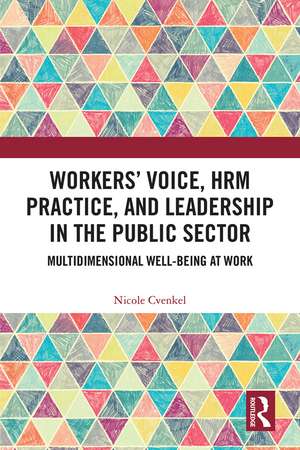Workers' Voice, HRM Practice, and Leadership in the Public Sector: Multidimensional Well-Being at Work
Autor Nicole Cvenkelen Limba Engleză Hardback – 16 dec 2019
| Toate formatele și edițiile | Preț | Express |
|---|---|---|
| Paperback (1) | 389.49 lei 43-57 zile | |
| Taylor & Francis – 2 aug 2021 | 389.49 lei 43-57 zile | |
| Hardback (1) | 1000.27 lei 43-57 zile | |
| Taylor & Francis – 16 dec 2019 | 1000.27 lei 43-57 zile |
Preț: 1000.27 lei
Preț vechi: 1219.84 lei
-18% Nou
Puncte Express: 1500
Preț estimativ în valută:
191.45€ • 197.30$ • 161.63£
191.45€ • 197.30$ • 161.63£
Carte tipărită la comandă
Livrare economică 03-17 martie
Preluare comenzi: 021 569.72.76
Specificații
ISBN-13: 9781409453253
ISBN-10: 1409453251
Pagini: 324
Dimensiuni: 156 x 234 x 23 mm
Greutate: 0.45 kg
Ediția:1
Editura: Taylor & Francis
Colecția Routledge
Locul publicării:Oxford, United Kingdom
ISBN-10: 1409453251
Pagini: 324
Dimensiuni: 156 x 234 x 23 mm
Greutate: 0.45 kg
Ediția:1
Editura: Taylor & Francis
Colecția Routledge
Locul publicării:Oxford, United Kingdom
Cuprins
List of Figures
List of Tables
Preface
Introduction: An Agenda for Research
Part I: Theoretical Developments in HRM, New Public Management and Well-Being Research Agendas
Chapter 1: Building a Foundation for Workplace Health and Well-Being in the Public Sector
Chapter 2: New Public Management Environment
Chapter 3: Theoretical Debates in HRM, Social Exchange and High Performing Organisations
Chapter 4: Well-Being at Work: A Review of the Literature
Part II: Methodological and Ethical Consideration
Chapter 5: A Methodological Approach to Workplace Well-Being Research
Chapter 6: Exploring Employees Quality of Working Life through Observations and Documentary Analysis in the Public Sector
Part III: The Workers’ Voice: HRM Practices, Line Management Leadership, and Well-Being at Work
Chapter 7: Tough Times: Well-Being in a Period of Restricted Resources in the Public Sector
Chapter 8: Leadership and Well-Being at Work: Implications for Job Satisfaction, Service Delivery and Performance
Chapter 9: Workplace Well-Being or Fun Initiatives: Perspectives from Senior Managers in the Public Sector
Chapter 10: Work, Quality of Working Life and Job Meaning: A Well-Being experience in the Public Sector
Chapter 11: Employees’ Reactions to HRM Practices and Well-Being in the Public Sector
Chapter 12: The Workers’ Voice: Concepts and Improvements in Well-Being for Individuals, Groups and Organisational Effectiveness
Chapter 13: Employees’ perspectives of working life realities, line management leadership and well-being in the Public Sector
Chapter 14: Evaluation of Well-Being at Work Research in Local Government
Author Biography
Abbreviations and Acronyms
Index
List of Tables
Preface
Introduction: An Agenda for Research
Part I: Theoretical Developments in HRM, New Public Management and Well-Being Research Agendas
Chapter 1: Building a Foundation for Workplace Health and Well-Being in the Public Sector
Chapter 2: New Public Management Environment
Chapter 3: Theoretical Debates in HRM, Social Exchange and High Performing Organisations
Chapter 4: Well-Being at Work: A Review of the Literature
Part II: Methodological and Ethical Consideration
Chapter 5: A Methodological Approach to Workplace Well-Being Research
Chapter 6: Exploring Employees Quality of Working Life through Observations and Documentary Analysis in the Public Sector
Part III: The Workers’ Voice: HRM Practices, Line Management Leadership, and Well-Being at Work
Chapter 7: Tough Times: Well-Being in a Period of Restricted Resources in the Public Sector
Chapter 8: Leadership and Well-Being at Work: Implications for Job Satisfaction, Service Delivery and Performance
Chapter 9: Workplace Well-Being or Fun Initiatives: Perspectives from Senior Managers in the Public Sector
Chapter 10: Work, Quality of Working Life and Job Meaning: A Well-Being experience in the Public Sector
Chapter 11: Employees’ Reactions to HRM Practices and Well-Being in the Public Sector
Chapter 12: The Workers’ Voice: Concepts and Improvements in Well-Being for Individuals, Groups and Organisational Effectiveness
Chapter 13: Employees’ perspectives of working life realities, line management leadership and well-being in the Public Sector
Chapter 14: Evaluation of Well-Being at Work Research in Local Government
Author Biography
Abbreviations and Acronyms
Index
Notă biografică
Dr. Nicole Cvenkel (Nee Baptiste) obtained her PhD in Human Resource Management and Organisational Behaviour at Roehampton University Business School. Her research focused on employees’ perspectives and reactions to HRM practices, the quality of working life, line management leadership and well-being at work.
Descriere
In this book, Nicole Cvenkel avers that whilst it is known that public sector employees are even less satisfied than those in the private sector, there has been very little research into the effects of working life experiences on employee well-being in public sector organisations.
